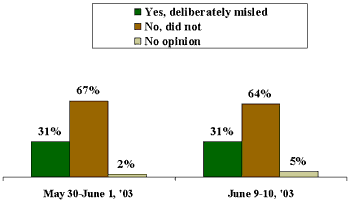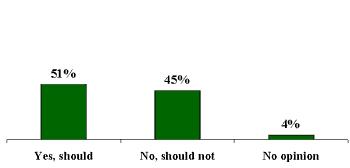GALLUP NEWS SERVICE
PRINCETON, NJ -- Only a minority of Americans -- mostly Democrats and independents -- believe the Bush administration has deliberately misled the American public about Iraq's possession of weapons of mass destruction. In part, this is related to the fact that most Americans continue to think it is likely that Iraq indeed did have weapons of mass destruction before the war began in March, although the number of Americans who are certain about this has dropped. Still, a slight majority of the public, including a third of Republicans, is willing to support the idea of congressional hearings into what the government knew about Iraq's capabilities to produce WMD before the war began.
These issues have become more important as the weeks have gone by since the end of the major fighting in Iraq and there continues to be no evidence that Iraq has either weapons of mass destruction or the facilities to create them. Some Democratic leaders and Democratic presidential candidates have begun criticizing the Bush administration for making what they contend were at the least misleading statements prior to the war. Additionally, news reports have focused on possible discrepancies between what the CIA may have told the administration about WMD and what the administration in turn told the public. Some in Congress are arguing for holding public hearings on the entire WMD situation and the severest of critics, both domestically and abroad, are arguing that the major premise for fighting the war may have been an exaggeration or fabricated.
Americans Hold to the Belief That Iraq Had Weapons of Mass Destruction, Although They Are Less Certain Now
The most recent Gallup Poll data suggest that well over 8 out of 10 Americans believe it is likely that Iraq did in fact have weapons of mass destruction and the facilities to create such weapons before the war, and that Iraq was also trying to develop nuclear weapons prior to the war. These broad sentiments have changed relatively little since February.
|
BELIEF THAT IT IS "LIKELY" OR "CERTAIN" THAT THREE ASSERTIONS ABOUT IRAQ AND WEAPONS OF MASS DESTRUCTION ARE TRUE |
||
|
% "Likely" or "Certain" -- Based on Interviews
Conducted Before the War |
% "Likely" or "Certain" -- Based on Interviews
Conducted After the War |
|
|
Iraq had facilities to create weapons of mass destruction before the war |
93% |
86% |
|
Iraq had biological or chemical weapons before the war |
94% |
86% |
|
Iraq was trying to develop nuclear weapons before the war |
90% |
83% |
These data strongly suggest that the average American continues to give credence to the Bush administration's (now controversial) assertions about WMD that provided much of the initial rationale for the war in Iraq.
But there has been a slightly more significant drop since February in the number of Americans who claim to be certain about Iraq's possession of such weapons.
The chart below displays the percentage of Americans who claimed to be certain of the three assertions relating to Iraq and WMD in interviewing conducted in February -- before the war began -- and again in our latest survey, conducted June 9-10. As can be seen, in February, 55% said they were certain that WMD facilities were in Iraq. Now, the number who are certain has dropped to 44%. Similar patterns pertain to the other two assertions:
|
CERTAINTY THAT THREE ASSERTIONS ABOUT IRAQ AND WEAPONS OF MASS DESTRUCTION ARE TRUE |
||
|
% Certain -- Based on Interviews Conducted
Before the War |
% Certain -- Based on Interviews Conducted
After the War |
|
|
Iraq had facilities to create weapons of mass destruction before the war |
55% |
44% |
|
Iraq had biological or chemical weapons before the war |
56% |
43% |
|
Iraq was trying to develop nuclear weapons before the war |
47% |
36% |
It's important to note that more than 4 out of 10 Americans continue to say, even now, they are certain that Iraq had WMD and the facilities to create WMD, and 36% continue to be certain in their beliefs that Iraq was trying to develop nuclear weapons before the war.
Did the Bush Administration Intentionally Mislead the Public?
Obviously, if one believes there were WMD in Iraq before the war began, then one is logically not likely to believe that the Bush administration intentionally misled the public about the issue in the months leading up to the war. And that's exactly what we find. The majority of Americans -- at least so far -- do not believe the Bush administration deliberately misled the public when it stressed so strongly that Iraq had WMD and that this was cause for war if the Iraqi regime did not allow full and open inspections.
| Do you think the Bush administration deliberately misled the American public about whether Iraq has weapons of mass destruction, or not? |
 |
As can be seen, these perceptions have not changed over the last two weeks, even as the publicity about not finding WMD has intensified, suggesting the increased focus on this issue has had little impact.
Not surprisingly, few Republicans believe that the Bush administration intentionally misled the public:
|
BELIEF THAT THE BUSH ADMINISTRATION DELIBERATELY MISLED THE AMERICAN PUBLIC ABOUT WMD, BY PARTY |
|
|
% Who Say the Bush Administration Deliberately Misled the American Public About WMD |
|
|
TOTAL SAMPLE |
31% |
|
Democrats |
48% |
|
Independents |
37% |
|
Republicans |
8% |
Congressional Hearings?
Because only a third of Americans feel the administration misled the public about Iraq's possession of WMD before the war began, we might estimate that no more than a third would support holding congressional hearings into what the government knew. But the idea of holding such congressional hearings is supported by slightly more than half of the public:
| Do you think Congress should -- or should not -- hold hearings into what the government knew about Iraq's capabilities to produce weapons of mass destruction at the time the U.S. went to war with Iraq? |
 |
| June 9-10, 2003 |
This question, it should be noted, asked respondents about the concept of hearings concerning what the "government" -- not the Bush administration -- knew about Iraq's capabilities to produce WMD when the United States went to war with Iraq. This suggests a little less partisan response to the question, a hypothesis supported by the fact that a third of Republicans say such hearings should be held (still less, of course, than the 57% of independents and 61% of Democrats who support congressional hearings).
It is also possible that some Americans support the idea of looking into what the intelligence community knew or didn't know about the WMD issue regardless of whether they believe the information was skewed or "spun" by the Bush administration. Faulty information is faulty information regardless of how it is used.
Survey Methods
These results are based on telephone interviews with a randomly selected national sample of 1,029 adults, 18 years and older, conducted June 9-10, 2003. For results based on this sample, one can say with 95 percent confidence that the maximum error attributable to sampling and other random effects is ±3 percentage points. In addition to sampling error, question wording and practical difficulties in conducting surveys can introduce error or bias into the findings of public opinion polls.
Which of the following statements best describes your view of whether -- [ITEMS A-E ROTATED, THEN ITEM F READ]? Would you say -- [ROTATED: you are certain that this is true, you think it is likely that this is true, but you are not certain, you think it is unlikely that this is true, but you are not certain, (or) you are certain that this is NOT true]?
A. Iraq had facilities to create weapons of mass destruction before the war
|
Certain is true |
Likely but not certain |
Unlikely but not certain |
Certain is |
No |
||
|
% |
% |
% |
% |
% |
||
|
2003 Jun 9-10 |
44 |
42 |
10 |
3 |
1 |
|
|
2003 Feb 7-9 ^ |
55 |
38 |
5 |
1 |
1 |
|
|
^ |
WORDING: Iraq has facilities to create weapons of mass destruction |
|||||
B. Iraq had biological or chemical weapons before the war
|
Certain is true |
Likely but not certain |
Unlikely but not certain |
Certain is |
No |
||
|
% |
% |
% |
% |
% |
||
|
2003 Jun 9-10 |
43 |
43 |
9 |
3 |
2 |
|
|
2003 Feb 7-9 ^ |
56 |
38 |
4 |
1 |
1 |
|
|
^ |
WORDING: Iraq has biological or chemical weapons |
|||||
C. Iraq was trying to develop nuclear weapons before the war
|
Certain is true |
Likely but not certain |
Unlikely but not certain |
Certain is |
No |
||
|
% |
% |
% |
% |
% |
||
|
2003 Jun 9-10 |
36 |
47 |
11 |
3 |
3 |
|
|
2003 Feb 7-9 ^ |
47 |
43 |
7 |
1 |
2 |
|
|
^ |
WORDING: Iraq is trying to develop nuclear weapons |
|||||
D. Iraq had ties to Osama bin Laden's terrorist organization known as al Qaeda before the war
|
Certain is true |
Likely but not certain |
Unlikely but not certain |
Certain is |
No |
||
|
% |
% |
% |
% |
% |
||
|
2003 Jun 9-10 |
40 |
42 |
11 |
4 |
3 |
|
|
2003 Feb 7-9 ^ |
39 |
47 |
10 |
2 |
2 |
|
|
^ |
WORDING: Iraq has ties to Osama bin Laden's terrorist organization known as al Qaeda |
|||||
SUMMARY TABLE: CERTAINTY ON IRAQ ISSUES
|
|
|
Likely but not certain |
|
% |
% |
|
|
Iraq had facilities to create weapons of mass destruction before the war |
44 |
42 |
|
Iraq had biological or chemical weapons before the war |
43 |
43 |
|
Iraq had ties to Osama bin Laden's terrorist organization known as al Qaeda before the war |
40 |
42 |
|
Iraq was trying to develop nuclear weapons before the war |
36 |
47 |
